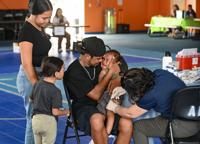Health
Guam Summit Addresses Mental Health Crisis Amid Rising Suicides

A recent summit held at the University of Guam focused on the urgent issues surrounding mental health, particularly in light of the island’s rising suicide rates. The event, organized by the Guam Homeless Coalition, highlighted the challenges faced by those experiencing mental health crises, especially within the homeless population. According to Jesse Libby, project coordinator for the 988 Lifeline for Guam, over 30,000 crisis interactions have been recorded since the service’s implementation in 2022. This statistic indicates that one in five residents may face a mental health crisis at some point in their lives.
Libby emphasized the alarming rates of suicide on the island, stating, “Guam statistically has high rates of suicide and suicide disproportionately affects people mostly in our community.” The summit, themed “Navigating homelessness and services amid shifting policy currents,” aimed to examine the intersection of mental health and homelessness, revealing significant gaps in available support services.
Challenges in Mental Health Services
A notable aspect discussed at the summit was the increasing reliance on the 988 Lifeline and the Mobile Crisis Response Team (MCRT), which operates under the Guam Behavioral Health and Wellness Center. Supervisor Mark Torre Jr. pointed out that a substantial portion of the calls to the lifeline comes from the homeless population, underscoring the correlation between mental health crises and homelessness. Torre noted that the MCRT is designed to provide mental health specialists as an alternative to police intervention, which can sometimes escalate situations unnecessarily.
“Typically, when you’re in a crisis or an emergency, what number do we call? 911. That’s not wrong, however, there’s now another option, there’s 988,” Torre explained. He highlighted the MCRT’s effectiveness, reporting that 75% of their activations successfully de-escalated and stabilized situations without involving law enforcement.
Despite the overwhelming demand, MCRT hours have recently shifted from a 24-hour operation to daily service from 07:00 to 23:30, effective September 1, 2025. Torre mentioned that the change was made to align with the peak demand hours but assured that the team is prepared to revert to 24-hour service if necessary.
Addressing Service Gaps
The summit also revealed critical gaps in mental health services on Guam. Dr. Carla T. Haddock of the Guam Behavioral Health and Wellness Center pointed out the absence of facilities dedicated to caring for individuals with dementia. “That is really, truly a gap in service on this island,” she stated, emphasizing the need for specialized support for conditions that often overlap with mental health disorders.
Legislative efforts are also underway to improve mental health services. Sen. Shelly Calvo has proposed Bill 219-38, aimed at modifying and expanding assisted outpatient treatment requirements to better address the needs of individuals in crises.
Additionally, Alyssa Roberto, project director for Guam Systems of Care, discussed the initiative to meet individuals in their communities. The program, which operates 24/7 with three eight-hour shifts, aims to provide accessible support and transportation for those in need.
The summit highlighted a growing awareness and urgency surrounding mental health issues in Guam. As communities continue to face challenges, the concerted efforts of various organizations and policymakers are essential in addressing these critical concerns.
-

 Science4 weeks ago
Science4 weeks agoInventor Achieves Breakthrough with 2 Billion FPS Laser Video
-

 Health1 month ago
Health1 month agoCommunity Unites for 7th Annual Into the Light Walk for Mental Health
-

 Top Stories1 month ago
Top Stories1 month agoCharlie Sheen’s New Romance: ‘Glowing’ with Younger Partner
-

 Entertainment1 month ago
Entertainment1 month agoDua Lipa Aces GCSE Spanish, Sparks Super Bowl Buzz with Fans
-

 Entertainment1 month ago
Entertainment1 month agoMother Fights to Reunite with Children After Kidnapping in New Drama
-

 Business1 month ago
Business1 month agoTyler Technologies Set to Reveal Q3 Earnings on October 22
-

 World1 month ago
World1 month agoR&B Icon D’Angelo Dies at 51, Leaving Lasting Legacy
-

 Health1 month ago
Health1 month agoCurium Group, PeptiDream, and PDRadiopharma Launch Key Cancer Trial
-

 Entertainment1 month ago
Entertainment1 month agoRed Sox’s Bregman to Become Free Agent; Tigers Commit to Skubal
-

 Health1 month ago
Health1 month agoNorth Carolina’s Biotech Boom: Billions in New Investments
-

 Science1 month ago
Science1 month agoNorth Carolina’s Biotech Boom: Billions Invested in Manufacturing
-

 Top Stories1 month ago
Top Stories1 month agoFormer Mozilla CMO Launches AI-Driven Cannabis Cocktail Brand Fast









